
This textbook is an introduction to the study of Western Civilization.
- Subject:
- History
- World History
- Material Type:
- Textbook
- Provider:
- Achieving the Dream
- Author:
- Assistant Professor John McLean
- Date Added:
- 05/19/2021

This textbook is an introduction to the study of Western Civilization.

A three-volume textbook covering the history of Western Civilization from c. 8000 BCE to the recent past. Written to be compatible with most existing Western Civilization courses at American colleges and universities, Western Civilization: A Concise History rejects the triumphalist narrative of western progress while still providing an essential overview of the histories of the ancient Mediterranean, Europe, and the global connections of the modern era. The second edition was released in winter 2020 and further revisions are planned by the author.
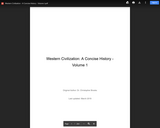
A three-volume textbook covering the history of Western Civilization from c. 8000 BCE to the recent past. Written to be compatible with most existing Western Civilization courses at American colleges and universities, Western Civilization: A Concise History rejects the triumphalist narrative of western progress while still providing an essential overview of the histories of the ancient Mediterranean, Europe, and the global connections of the modern era. The first edition was released in spring, 2019, and further revisions are planned by the author.
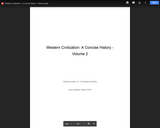
Western Civilization: A Concise History is an Open Educational Resource textbook covering the history of Western Civilization from approximately 8,000 BCE to 2017 CE. It is available in three volumes covering the following time periods and topics:
Volume 1: from the origins of civilization in Mesopotamia c. 8,000 BCE through the early Middle Ages in Europe c. 1,000 CE. Volume 1 covers topics including Mesopotamia,Egypt, Persia, Greece, Rome, the Islamic caliphates, and the early European Middle Ages.
Volume 2: from the early Middle Ages to the French Revolution in 1789 CE. Volume 2covers topics including the High Middle Ages, the Renaissance, the European conquest of the Americas, the Reformation, the Scientific Revolution, and the Enlightenment.
Volume 3: from the Napoleonic era to the recent past. Volume 3 covers topics including the Industrial Revolution, the politics of Europe in the nineteenth century, modern European imperialism, the world wars, fascism, Nazism, and the Holocaust, the postwar era, the Cold War, and recent developments in economics and politics.

Western Civilization: A Concise History? is an Open Educational Resource textbook covering the history of Western Civilization from approximately 8,000 BCE to 2017 CE. It is available in three volumes covering the following time periods and topics:
Volume 1: from the origins of civilization in Mesopotamia c. 8,000 BCE through the early Middle Ages in Europe c. 1,000 CE. Volume 1 covers topics including Mesopotamia,Egypt, Persia, Greece, Rome, the Islamic caliphates, and the early European Middle Ages.
Volume 2: from the early Middle Ages to the French Revolution in 1789 CE. Volume 2covers topics including the High Middle Ages, the Renaissance, the European conquest of the Americas, the Reformation, the Scientific Revolution, and the Enlightenment.
Volume 3: from the Napoleonic era to the recent past. Volume 3 covers topics including the Industrial Revolution, the politics of Europe in the nineteenth century, modern European imperialism, the world wars, fascism, Nazism, and the Holocaust, the postwar era, the Cold War, and recent developments in economics and politics.

Western Civilization: A Concise History? is an Open Educational Resource textbook covering the history of Western Civilization from approximately 8,000 BCE to 2017 CE. It is available in three volumes covering the following time periods and topics:
Volume 1: from the origins of civilization in Mesopotamia c. 8,000 BCE through the early Middle Ages in Europe c. 1,000 CE. Volume 1 covers topics including Mesopotamia,Egypt, Persia, Greece, Rome, the Islamic caliphates, and the early European Middle Ages.
Volume 2: from the early Middle Ages to the French Revolution in 1789 CE. Volume 2covers topics including the High Middle Ages, the Renaissance, the European conquest of the Americas, the Reformation, the Scientific Revolution, and the Enlightenment.
Volume 3: from the Napoleonic era to the recent past. Volume 3 covers topics including the Industrial Revolution, the politics of Europe in the nineteenth century, modern European imperialism, the world wars, fascism, Nazism, and the Holocaust, the postwar era, the Cold War, and recent developments in economics and politics.
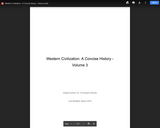
Western Civilization: A Concise History is an Open Educational Resource textbook covering the history of Western Civilization from approximately 8,000 BCE to 2017 CE. It is available in three volumes covering the following time periods and topics:
Volume 1: from the origins of civilization in Mesopotamia c. 8,000 BCE through the early Middle Ages in Europe c. 1,000 CE. Volume 1 covers topics including Mesopotamia,Egypt, Persia, Greece, Rome, the Islamic caliphates, and the early European Middle Ages.
Volume 2: from the early Middle Ages to the French Revolution in 1789 CE. Volume 2covers topics including the High Middle Ages, the Renaissance, the European conquest of the Americas, the Reformation, the Scientific Revolution, and the Enlightenment.
Volume 3: from the Napoleonic era to the recent past. Volume 3 covers topics including the Industrial Revolution, the politics of Europe in the nineteenth century, modern European imperialism, the world wars, fascism, Nazism, and the Holocaust, the postwar era, the Cold War, and recent developments in economics and politics.

This textbook is intended to meet the curriculum requirements for St. Clair County Community College's HIS 101 course through the use of primary source content. Topics covered include ancient Greece, ancient Rome, the rise of Christianity, the Middle Ages, the emergence of Islam, and the Renaissance.
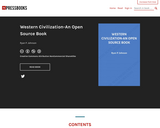
This textbook is intended to meet the curriculum requirements for St. Clair County Community College's HIS 101 course through the use of primary source content. Topics covered include ancient Greece, ancient Rome, the rise of Christianity, the Middle Ages, the emergence of Islam, and the Renaissance.
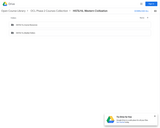
History 116, the first part of the introductory surveys of Western Civilization. This course covers the period from early civilized man to the early Middle Ages of Europe, with emphasis on Greece, Rome, Egypt and other Mediterranean peoples.

Pre-history to the Wars of Religion, a period extending from 10,000 BCE to 1648 CE. Includes transition from pre-historic to the historic period, Greco-Roman world, Early, Central, and Late Middle Ages, and Renaissance and Reformation.
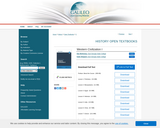
This hybrid textbook and open course is a comprehensive set of teaching materials for Western Civilization I (until 1648), created through a Round Six ALG Textbook Transformation Grant. Topics covered include prehistory and ancient history by region, the Middle Ages, the Renaissance, and the Reformation.

The objective of this course is to cover history from the Wars of Religion through the current day. Along the way we’ll go through the reformation; the counter-reformation; global exchange, conflict and empire and both the scientific and industrial revolutions of the 1600-1700s; witch trials; evolution; new imperialism; WWI & II; the cold war; and the impacts of living in a global society.
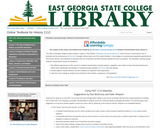
Lesson 1: The Age of Enlightenment, Reason & Scientific Revolution
Lesson 2: Changes in Political Thought: Imperialism, Colonialism, Nationalism, & Revolution
Lesson 3: Cultural Life, 1700-1900 - Arts, Music, Literature, & Religion
Lesson 4: The World Outside the West
Lesson 5: Industrialization & Lived Experiences
Lesson 6:The World in Two Wars
Lesson 7: Post-Colonial World Culture & Globalization
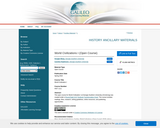
This open course for World Civilization I at Georgia Southern University (Armstrong) was created under a Round Eight ALG Textbook Transformation Grant. The course includes readings, films, research, writing guidelines, online resources, and publishing opportunities.
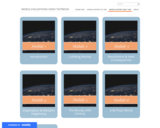
This video textbook started with the creation of 73 supplementary 10-20 minute video lectures for World Civilizations at Georgia Highlands College through a Round 10 Textbook Transformation Grant. A Round 14 Mini-Grant enabled the team to create guiding questions, key terms, transcript, and table of contents for each of the 73 videos, followed by a public website to share these newly-organized resources with students and faculty.
Topics include prehistory, the classical world system, trade, and the old world system, revolutions, imperialism and hegemony, the 20th century, and new global systems in the 21st century.
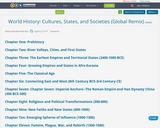
This is a remixed version of World History: Culture, States, and Societies to 1500 by Berger, et al. It's a textbook suitable for the World History survey. I have reorganized the text in order to provide a more globally integrated narrative. Each chapter invites students to compare and contrast developments across regions during a period of time.
This version of the book retains the text of the original but with updated references to chapters. I verified and, if necessary, updated links to online resources. In cases where the exact illustration used in the original version was not available, I have substituted equivalent ones. I also created and edited segues and other “connective tissue” as well to (hopefully) ensure that this version of the book reads as smoothly as the original.
Additional changes include:
More concise lists of “key terms” in each chapter
Expanded coverage of the Persian Empire
Expanded coverage of the end of the Yuan Dynasty
Added brief overview of the early Ming Dynasty including the voyages of Zheng He
Work on this adaption was generously sponsored by a grant from Michigan Colleges Online, a project of the Michigan Community College Association.
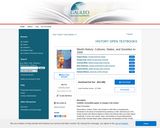
World History: Cultures, States, and Societies to 1500 offers a comprehensive introduction to the history of humankind from prehistory to 1500. Authored by six USG faculty members with advance degrees in History, this textbook offers up-to-date original scholarship. It covers such cultures, states, and societies as Ancient Mesopotamia, Ancient Israel, Dynastic Egypt, India’s Classical Age, the Dynasties of China, Archaic Greece, the Roman Empire, Islam, Medieval Africa, the Americas, and the Khanates of Central Asia.
It includes 350 high-quality images and maps, chronologies, and learning questions to help guide student learning. Its digital nature allows students to follow links to applicable sources and videos, expanding their educational experience beyond the textbook. It provides a new and free alternative to traditional textbooks, making World History an invaluable resource in our modern age of technology and advancement.

Survey of world history from ancient civilizations to 1500.
Chapter 1: Prehistory
Chapter 2: Early Middle Eastern and Northeast African Civilizations
Chapter 3: Ancient and Early Medieval India
Chapter 4: China and East Asia to the Ming Dynasty
Chapter 5: The Greek World from the Bronze Age to the Roman Conquest
Chapter 6: The Roman World from 753 BCE to 500 CE
Chapter 7: Western Europe and Byzantium circa 500 - 1000 CE
Chapter 8: Islam to the Mamluks
Chapter 9: African History to 1500
Chapter 10: The Americas
Chapter 11: Central Asia
Chapter 12: Western Europe and Byzantium circa 1000 – 1500 CE

World History Since 1500: An Open and Free Textbook is designed to cover world history from 1500 to the present in 15 chapters. The OER-supported textbook can be downloaded as a pdf or viewed online. The textbook serves to weave insights from many perspectives into stories and narratives that will help students develop a framework to organize and connect ideas, geographical locations, and timelines allowing them to think critically and broadly about the world around them. In addition to helping students master the sequence and scope of world history from 1500, the textbook helps develop empathy for people who live and lived in different parts of the world and during different historical times leading to the creation of empathic and knowledgeable global citizens who are aware of and concerned about the world around them.